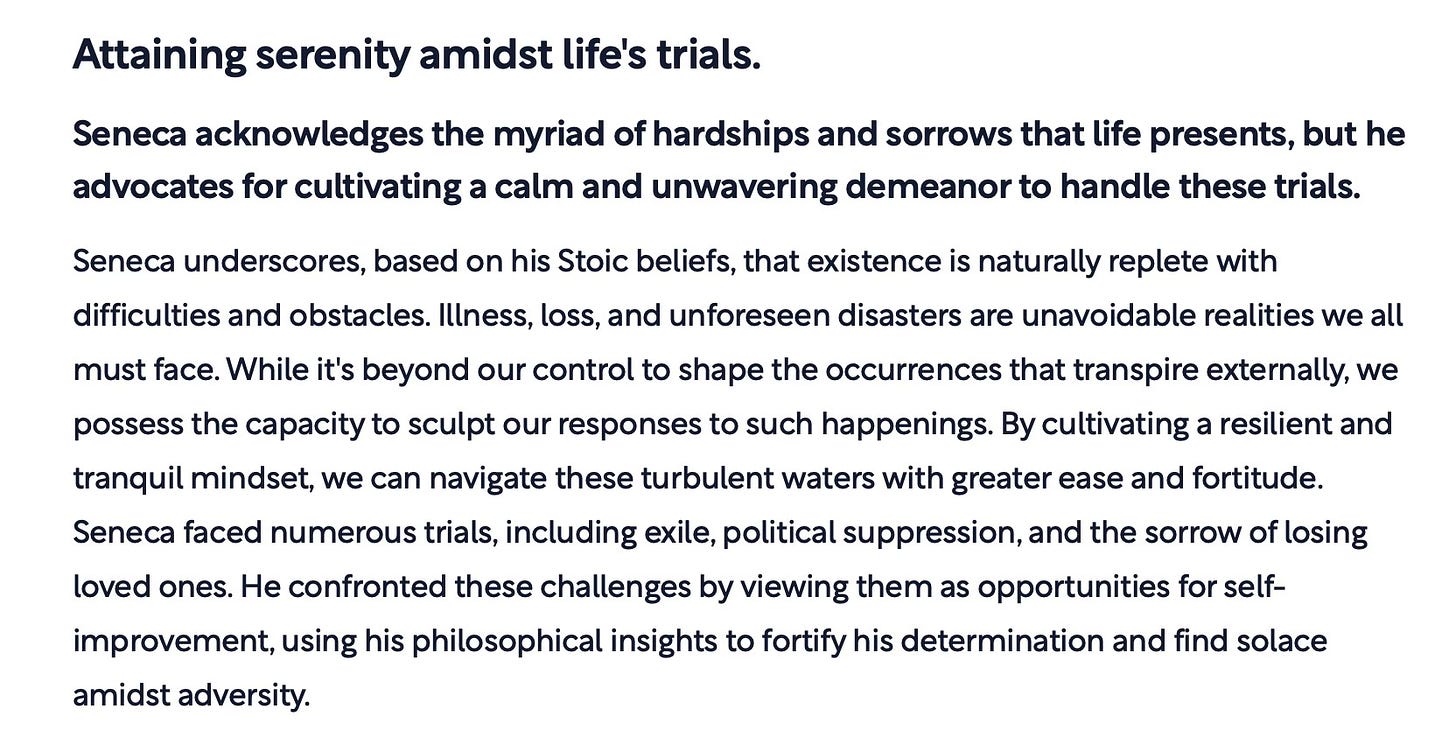6 Ideas by Alan Watts on Doing Life Right
>The One (Tiny) Decision That Quietly Controls Your Entire Life
Postanly Weekly is a reader-supported newsletter. To support my work, you can upgrade to a paid subscription for $9 per month or $60 for an entire year. Or use this special link for 50% off forever. Plus free access to The Thinking Edge: 27 (with future updates) thinking tools, models, principles for life and career. Inspired by the wisdom of brilliant minds.
In partnership with Shortform
Self-improvement books are indispensable for personal growth. But their actionable ideas and lessons are not always easy to find. Shortform is an easily digestible solution to this obstacle. The summaries and the vast library of the most impactful self-help books can help you learn and apply wisdom faster.
Shortform distills each book's core ideas with chapter breakdowns, analysis, commentary, and even counterpoints from other sources, allowing you to get the most of books fast. They have all of my favourite books on self-improvement. Shortform doesn’t stop at books. They’ve got guides for articles and podcasts. Experience a new level of personal growth with Shortform.
Postanly readers get a free trial and 20% discount on the annual subscription.
Alan Watts, a British philosopher, writer, and speaker, was a significant figure in the counterculture movement of the 1960s and 1970s. His ideas on the nature of reality have inspired his readers to pursue a more meaningful life differently. With his unique blend of eastern wisdom and western philosophy, Watts continues to inspire people seeking a more fulfilling life. His wisdom is refreshing perspective that invites us to pause, reflect, and reconnect with what truly matters.
Alan Watts believed one of the keys to a meaningful life lies in our ability to transcend societal expectations and embrace the fundamental nature of our existence. His teachings encourage us to question the constraints of conventional wisdom and explore personal perspectives that can liberate us from the shackles of dissatisfaction and discontent.
Watts challenges us to reevaluate our relationship with ourselves, others, and the world around us, urging us to shed the illusions that hinder our ability to experience the present moment fully. Through his philosophy, Watts emphasises the importance of self-awareness, mindfulness, and cultivating a deep sense of interconnectedness. He encourages us to embrace the beauty of impermanence, surrender to the flow of life, and find solace in the eternal dance of existence.
Here are some key themes and ideas from Alan Watts that contribute to his meaningful life philosophy.
1. Find meaning in the ordinary
“The meaning of life is just to be alive. It is so plain and so obvious and so simple. And yet, everybody rushes around in a great panic as if it were necessary to achieve something beyond themselves.” — Alan Watts
Watts emphasised that meaning and purpose can be found in the most mundane aspects of life. According to him, many people search for meaning and purpose in grand achievements, extraordinary experiences, or external pursuits, neglecting the value inherent in ordinary, everyday activities.
Rather than pursuing external validation, he suggested that true fulfilment comes from fully engaging in everyday activities and recognising the extraordinary within the ordinary. Watts encouraged individuals to appreciate the beauty of the present moment, regardless of the circumstances.
Expand your awareness, recognise the richness in the ordinary, and open yourself up to many life experiences with a rare appreciation for its inherent meaning. Whether washing dishes, taking a walk, or engaging in routine tasks, Watts suggested that we can find fulfilment and purpose by fully participating in these activities without constantly longing for something else or waiting for significant events to occur.
2. Be fully present in the here and now
“This is the real secret of life — to be completely engaged with what you are doing in the here and now. And instead of calling it work, realise it is play.” — Alan Watts
Watts emphasised the significance of being fully present in the here and now. He often pointed out that much of our time is spent dwelling on memories of the past or anxiously planning for the future, often at the expense of fully experiencing the present.
He argued that this tendency to be mentally absent from the current moment robs us of the richness and beauty that exist right in front of us. Watts observed true happiness and satisfaction can be found by letting go of worries about the past or the future and fully immersing oneself in the present moment.
He believed that the past and the future are illusions and that the only thing that is real is the present moment. He taught by being fully present in the present moment, we can experience a greater sense of peace, happiness, and fulfilment.
3. Transcend your ego
“Waking up to who you are requires letting go of who you imagine yourself to be.” — Alan Watts
Watts explored the idea of transcending the ego, the sense of a separate and individual self. He delved into the concept of the ego as a construct that creates a false sense of identity and separateness from the rest of existence.
Watts believed that the ego is a mental construct that arises from our tendency to conceptualise ourselves as separate entities distinct from the world around us. Identification with the ego leads to isolation, insecurity, and the constant pursuit of self-preservation and self-enhancement.
According to Watts, to transcend your ego, recognise the illusory nature of the separate self and expand your perception to embrace a broader and more interconnected view of existence. Let go of the need to constantly reinforce and defend your ego and embrace a more fluid and expansive sense of self. He suggested that our true nature is not confined to the boundaries of the individual ego but is inherently connected to the entire universe.
4. Overcome the illusion of control
“No amount of anxiety makes any difference to anything that is going to happen.” — Alan Watts
According to Watts, many people strive to maintain a sense of control over their lives by planning, predicting outcomes, and creating rigid structures. They seek certainty in their relationships, careers, and personal identities, hoping that by doing so, they can avoid the inherent unpredictability of existence.
Watts believed the desire for control and certainty often leads to dissatisfaction and a sense of disconnectedness from the present moment. He argued that this pursuit is futile because life is unpredictable and ever-changing.
When we try to control and predict the future, he observed that we miss out on the richness of life unfolding in the here and now. Watts encouraged people to let go of the illusion of control and surrender to the natural flow of existence, finding liberation and peace in embracing life’s uncertainties.
5. Let go of attachment
“…the disappearance of the effort to let go is precisely the disappearance of the separate thinker, of the ego trying to watch the mind without interfering. — Alan Watts
Watts argued much of human suffering arises from our attachment to outcomes, our desire to control and manipulate our lives, and our resistance to the natural flow of existence. He observed that our attempts to tightly control and manipulate everything only lead to frustration, anxiety, and alienation.
He proposed “letting go” to experience greater freedom and peace. Letting go means relinquishing our attachment to specific outcomes, surrendering the need for perfect outcomes, and accepting the inherent uncertainty of life.
He suggested that by relinquishing our attachment to external outcomes and embracing the impermanence of life, we can find greater peace and contentment.
6. Replace fear with curiosity
“By replacing fear of the unknown with curiosity we open ourselves up to an infinite stream of possibility. We can let fear rule our lives or we can become childlike with curiosity, pushing our boundaries, leaping out of our comfort zones, and accepting what life puts before us.” — Alan Watts
According to Watts, playfulness is key to discovering a better sense of life satisfaction. The tendency to take life too seriously and approach it with rigid seriousness often robs us of spontaneity, creativity, and delight in playfulness.
Watts suggested that life should be approached as a joyful dance rather than a serious and burdensome task. He believed that when we cultivate a playful attitude, we open ourselves up to the wonders and possibilities of life.
For a good life, approach life with a sense of play, curiosity, and wonder. Engage in activities that bring you and find meaning in the simple pleasures of life. Watts saw playfulness and finding joy in everyday experiences as integral to living a meaningful life.
Free post on Medium
>The One (Tiny) Decision That Quietly Controls Your Entire Life
“If every day looked like today, what kind of life would you be creating?” The answer might terrify you. Or inspire you. Either way, it’s useful information. Existentialist Albert Camus said, “Life is the sum of all your choices.”
Read the complete post for free.
Book of the week
While many of us feel we don't have enough time, On the Shortness of Life by Seneca argues that we unknowingly squander the time we do have.
Shortform summary highlight:
My free books (or donate what you want)
Personal growth tools I use
> Brain food, delivered daily — Every day Refind analyses thousands of articles and send you only the best, tailored to your interests. Loved by 530,181 curious minds. Subscribe for free.
> Newsletters to enhance your learning — This is a summary of thought leaders and publications. Productivity, finance, healthy-living, self-improvement, career growth and more. Discover newsletters.
Until Next Week,
Be Well.
Thomas
“We never live; we are always in the expectation of living.” —Voltaire
Postanly Weekly is a reader-supported newsletter. To support my work, you can upgrade to a paid subscription for $9 per month or $60 for an entire year. Or use this special link for 50% off forever. Plus free access to The Thinking Edge: 27 (with future updates) thinking tools, models, principles for life and career. Inspired by the wisdom of brilliant minds.






